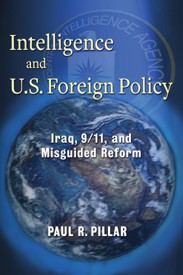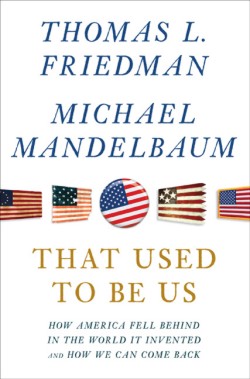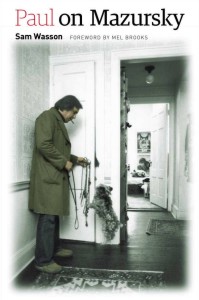|
|
|
|
| |
|
 Was Bush Right After All? Was Bush Right After All?
IMPLY amazing. A former CIA
official contends that we may never know the reason the
United States went to war in Iraq.
There was no policy process in
place in the Bush administration to address this decision.
There were many discussions but investigative reporters
found "no meeting, no options paper, no debate in the White
House Situation Room, or anything else that addressed
whether an invasion of Iraq was in U.S. interests or not as
input to a presidential decision on whether to invade,"
writes Paul R. Pillar in
Intelligence and U.S. Foreign
Policy.
Iraq was the first major offensive
war, in which the U.S. was the aggressor, since the war
against Spain in the previous century.
Concern about Saddam Hussein
weapons of mass destruction had no influence on the decision
to invade. The decision was made well before the WMD
analysis was made, Pillar asserts.
So what was this all about? The
neoconservative aim for the war on Iraq was to promote a new
political order of democracy and civil rights that would
become a domino effect on neighboring Arab dictatorial
regimes.
So did we succeed? By the measure
of the Arab Awakening that continues to roil the Middle
East, from Libya to Yemen and on (hopefully) to Syria and
beyond, then Bush’s domino policy of democracy has had an
effect. Bush initiated the effort and Obama reaps the
satisfaction.
Pillar, who works in the Security
Studies Program at the Edmund A. Walsh School of Foreign
Service at Georgetown University, also offers many proposals
that he believes would improve government effectiveness,
such as relying on career diplomats to serve as ambassadors
rather than appointing major campaign contributors to
foreign posts, and curtailing greatly the number of
political appointees in the executive branch.
Last thought: Could it be that the
Iraq war was George W. Bush’s revenge on Saddam Hussein in
view of the Iraqi tyrant’s alleged plot to assassinate the
previous American president, Bush’s father? Just a hunch.
(Columbia University Press, 423 pages,
Amazon.com Price: $29.50)
|
|
Back
to Top |
 |
|
 What’s Wrong With Us? What’s Wrong With Us?
TRY never to miss Thomas
Friedman’s column in The New York
Times. His
twice a week op-ed piece brimming with profound analysis,
keen observations and common sense advice is so refreshing
that I hope it’s required reading at the White House. He is
on the mark on every topic (except when he sets his sights
on Israel and often strays way off track to appear more
Arab-centric than the Arabs).
In
That Used To Be Us: How
America Fell Behind in the World It Invented and How We Can
Come Back he partners with Michael Mandelbaum, director
of American Foreign Policy at The Johns Hopkins University
School of Advanced International Studies to show us how
tragically America has gone downhill in this new century.
Some people are saying that Great Britain’s century gave way
to the American century, and this century belongs to a
rising China.
There are so many things wrong
with America that we have lost our way and become a country,
with enormous potential, that is falling into disrepair and
political disarray. Globalization robbed us of capital and
jobs in the U.S. We face major problems in education,
deficits and debt, energy and climate change. Because our
political system is paralyzed, we can’t address these
problems.
Being optimists, the authors spend
the second half of the book with strategy for overcoming
these problems that are holding America back from focusing
on these challenges, adapting to a new era post-Cold War,
and realizing the country’s potential.
To continue to be exceptionalist
as in the past, America needs to overcome political
differences to adjust its policies on immigration, upgrade
our infrastructure, foster innovation, and above all
strengthen our education system. There’s more but I refer
you to the book.
The Duke of Wellington, who
defeated Napoleon once said that this Battle of Waterloo in
1815 was won "on the playing fields of Eton." In the same
spirit, Friedman and Mandelbaum argue that "the stability
and prosperity of the twenty-firs-century international
order will be maintained—or lost—in the classrooms of
America’s public schools."
They continue: "We have greater
potential than any other country to thrive in the future by
becoming the world’s most attractive launching pad—the place
where everyone wants to come to work, invent, collaborate,
or start something new in order to get the most out of the
new hyper-connected world." (Farrar, Straus and
Giroux, 394 pages,
$28.00,
Amazon.com Price: $15.88)
|
|
Back
to Top |
 |
|
 Page Turners Page Turners
URIFYING THE NATION Romania,
where King Carol longed to purify the nation with ethnic
cleansing—that is getting rid of the Jews and Roma—got a
unique opportunity in 1940 when the country evolved into a
satellite of Berlin. King and country united to embrace the
Nazi anti-Semitism. Vladimir Solonari, associate professor
of history at the University of Central Florida, in a
well-researched book on Romanian political turmoil during
the war, shows how the country’s alliance with Nazi Germany
served its own geographical interests: trying to keep
Hungary from grabbing Transylvania and the Soviet Union from
gobbling up Bessarabia and Bukovina. To achieve ethnic
homogenization, in 1941 Romania implemented, for the first
time in its history, massive population exchange.
(Woodrow Wilson Center Press/Johns Hopkins University Press,
451 pages, $65.00,
Amazon.com Price: $52.29)
 THE
HISTORY OF THE HOLOCAUST IN ROMANIA "Right from the dawn of the modern Romanian
state, hatred of Jews was an overt and constant feature of
Romanian society." That’s how Jean Ancel, a Romanian-born
Israeli historian, begins his painful description of the
role Romanians played in Hitler’s pursuit to eliminate the
Jewish people. Ancel, author of several deeply researched
volumes on Romania’s genocidal history, continues:
"Antisemitism left its imprint on Romanian nationalism and
was the fuel that catalyzed national consolidation. It
accompanied the nation from the dawn of its collective
consciousness and did not abandon it even after the
realization of its dream of liberation and the unification
of all Romanian territories. Already by the mid-nineteenth
century the idea that Jews constituted both an internal and
external threat, and that they were part of a world
conspiracy aimed at destroying the Romanian state, had
penetrated the consciousness of many Romanians." The chapter
on the well-documented pogrom in Iasi on June 29, 1941, is
thre subject of an expanded book forthcoming from Yad
Vashem, Jerualem. (University of Nebraska Press, 696
pages,
$50.00,
Amazon.com Price: $44.24) THE
HISTORY OF THE HOLOCAUST IN ROMANIA "Right from the dawn of the modern Romanian
state, hatred of Jews was an overt and constant feature of
Romanian society." That’s how Jean Ancel, a Romanian-born
Israeli historian, begins his painful description of the
role Romanians played in Hitler’s pursuit to eliminate the
Jewish people. Ancel, author of several deeply researched
volumes on Romania’s genocidal history, continues:
"Antisemitism left its imprint on Romanian nationalism and
was the fuel that catalyzed national consolidation. It
accompanied the nation from the dawn of its collective
consciousness and did not abandon it even after the
realization of its dream of liberation and the unification
of all Romanian territories. Already by the mid-nineteenth
century the idea that Jews constituted both an internal and
external threat, and that they were part of a world
conspiracy aimed at destroying the Romanian state, had
penetrated the consciousness of many Romanians." The chapter
on the well-documented pogrom in Iasi on June 29, 1941, is
thre subject of an expanded book forthcoming from Yad
Vashem, Jerualem. (University of Nebraska Press, 696
pages,
$50.00,
Amazon.com Price: $44.24)
 PAUL ON MAZURSKY A clever book
on the career of director Paul Mazursky who made such films
as Next Stop, Greenwich Village; Bob &Carol & Ted
& Alice; Moscow on the Hudson; Down and
Out in Beverly Hills. Film scholar Sam Wasson engages in
lengthy but fascinating conversations with the director,
drawing out delicious Hollywood gossip and backstage
shenanigans, giving you an inside perspective at Hollywood
wheeling and dealing. Lots of fun. They even tell each jokes
during the interviews. Here’s one from Mazursky: Max and
Sadie are in their condo in Miami, it’s three o’clock,
they’re watching TV and having dinner. Max says, "I’m going
to get up and go into the kitchenette and get myself some
vanilla ice cream." Sadie says, "What are you going to get
it for? I’ll get it for you?" He says, "You’ve got a bad
memory. You’re going to forget." She says, "I won’t forget."
He says, "You’ll forget." She says, "I won’t forget." He
says, "All right. Get me a bowl of vanilla ice cream." So
she gets up and goes into the kitchenette and calls out,
"You want a bowl of vanilla ice cream?" He says, "Yeah and
put on it some whipped cream." She says, "Okay." He says,
"And a maraschino cherry. Don’t forget!" She says, "I won’t
forget!" She comes back five minutes later and gives him two
fried eggs. He says, "I told you you’d forget!" She says,
"What did I forget?" He says, "My toast!"
(Wesleyan University Press, 342 pages, illustrated,
$35.00,
Amazon.com Price: $26.60) PAUL ON MAZURSKY A clever book
on the career of director Paul Mazursky who made such films
as Next Stop, Greenwich Village; Bob &Carol & Ted
& Alice; Moscow on the Hudson; Down and
Out in Beverly Hills. Film scholar Sam Wasson engages in
lengthy but fascinating conversations with the director,
drawing out delicious Hollywood gossip and backstage
shenanigans, giving you an inside perspective at Hollywood
wheeling and dealing. Lots of fun. They even tell each jokes
during the interviews. Here’s one from Mazursky: Max and
Sadie are in their condo in Miami, it’s three o’clock,
they’re watching TV and having dinner. Max says, "I’m going
to get up and go into the kitchenette and get myself some
vanilla ice cream." Sadie says, "What are you going to get
it for? I’ll get it for you?" He says, "You’ve got a bad
memory. You’re going to forget." She says, "I won’t forget."
He says, "You’ll forget." She says, "I won’t forget." He
says, "All right. Get me a bowl of vanilla ice cream." So
she gets up and goes into the kitchenette and calls out,
"You want a bowl of vanilla ice cream?" He says, "Yeah and
put on it some whipped cream." She says, "Okay." He says,
"And a maraschino cherry. Don’t forget!" She says, "I won’t
forget!" She comes back five minutes later and gives him two
fried eggs. He says, "I told you you’d forget!" She says,
"What did I forget?" He says, "My toast!"
(Wesleyan University Press, 342 pages, illustrated,
$35.00,
Amazon.com Price: $26.60)
 AMERICA IN THE TWENTIETH CENTURY
This is an ambitious series of history and commentary
encompassing each decade under the editorial direction of
John Robert Greene, history professor at Cazenovia College.
Presenting American history by the decade makes for a great
survey course for undergraduates, and for the rest of us.
There is
America in the Twenties (211 pages), by
history professor Ronald Allen Goldberg of Thomas Nelson
Community College in Hampton, Virginia, which surveys a
decade that brought prosperity to the urban-based business
community but hardship in rural America. Goldberg also wrote
America in the Forties (213 pages), a most
influential time in the American saga, when the nation faced
armed conflict in Europe and Asia, a Cold War after that,
and the dawn of the atomic age.
America in the Fifties
(351 pages), by history professor Andrew J. Dunar of the
University of Alabama in Huntsville, deals with the Korean
War, the Eisenhower years, popular culture during the cold
war, and foreign policy at the dawn of the space age.
Greene’s
America in the Sixties (200 pages) is most
interesting as it focuses on the hippies, counterculture,
sexual revolution, civil rights and Vietnam.
America in
the Seventies (226 pages) by Stephanie A.
Slocum-Schaffer, assistant professor of political science at
Shepherd College in Shepherdstown, West Virginia, deals with
Nixon (and the Watergate scandal), Ford and Carter and
social movements of the time. Make room on your bookshelf
for each decade as it rolls out from Syracuse University
Press at $19.95 paperback ($45 for the hardbound copy). The
paperbound copy of the Fifties is
$24.95 at Amazon.com. AMERICA IN THE TWENTIETH CENTURY
This is an ambitious series of history and commentary
encompassing each decade under the editorial direction of
John Robert Greene, history professor at Cazenovia College.
Presenting American history by the decade makes for a great
survey course for undergraduates, and for the rest of us.
There is
America in the Twenties (211 pages), by
history professor Ronald Allen Goldberg of Thomas Nelson
Community College in Hampton, Virginia, which surveys a
decade that brought prosperity to the urban-based business
community but hardship in rural America. Goldberg also wrote
America in the Forties (213 pages), a most
influential time in the American saga, when the nation faced
armed conflict in Europe and Asia, a Cold War after that,
and the dawn of the atomic age.
America in the Fifties
(351 pages), by history professor Andrew J. Dunar of the
University of Alabama in Huntsville, deals with the Korean
War, the Eisenhower years, popular culture during the cold
war, and foreign policy at the dawn of the space age.
Greene’s
America in the Sixties (200 pages) is most
interesting as it focuses on the hippies, counterculture,
sexual revolution, civil rights and Vietnam.
America in
the Seventies (226 pages) by Stephanie A.
Slocum-Schaffer, assistant professor of political science at
Shepherd College in Shepherdstown, West Virginia, deals with
Nixon (and the Watergate scandal), Ford and Carter and
social movements of the time. Make room on your bookshelf
for each decade as it rolls out from Syracuse University
Press at $19.95 paperback ($45 for the hardbound copy). The
paperbound copy of the Fifties is
$24.95 at Amazon.com.
 THE OBITS If you’ve been
following the obits in the New York Times faithfully every
day, as I have, you’ll welcome this neat collection from
2010 to 2011. William McDonald, the obituaries editor since
2006, presents the best, most interesting and compelling
curtain calls (as Stephen King calls them) from the nation’s
paramount newspaper. (Workman Publishing, paperback, 590
pages,
$13.95,
Amazon.com Price: $11.16) THE OBITS If you’ve been
following the obits in the New York Times faithfully every
day, as I have, you’ll welcome this neat collection from
2010 to 2011. William McDonald, the obituaries editor since
2006, presents the best, most interesting and compelling
curtain calls (as Stephen King calls them) from the nation’s
paramount newspaper. (Workman Publishing, paperback, 590
pages,
$13.95,
Amazon.com Price: $11.16)
 ALICE’S PIANO What an
extraordinary life! Alice Herz-Sommer emerged from Prague as
a gifted pianist, starring in concerts and recitals across
the continent – until the Nazis sent almost all the Jews to
the death camps. Alice was lucky to find herself in
Theresienstadt, a Nazi "show camp" maintained to fool the
world that Jews were treated humanely in the concentration
camps. As many dropped dead from the cruelty, hunger and
exhaustion, Alice’s piano playing kept her barely alive and
gave hope to many of the prisoners. It’s a heart breaking
story…until the Germans were driven out of Czechoslovakia
and the Russian tanks rolled into Theresienstadt. For Alice
there was no going back. Local citizens had taken ownership
of the homes and possessions of Jews who had been deported
to the camps. She settled in Israel first, then made her
home in England. At 108 Alice is the oldest living Holocaust
survivor and still inspires all with her piano. Her amazing
story, tragic but inspiring, is set forth skillfully by
Melissa Muller and Reinhard Piechocki. It’s a story poised
for screen treatment. (St. Martin’s Press, 349 pages,
$26.99,
Amazon.com Price: $17.63) ALICE’S PIANO What an
extraordinary life! Alice Herz-Sommer emerged from Prague as
a gifted pianist, starring in concerts and recitals across
the continent – until the Nazis sent almost all the Jews to
the death camps. Alice was lucky to find herself in
Theresienstadt, a Nazi "show camp" maintained to fool the
world that Jews were treated humanely in the concentration
camps. As many dropped dead from the cruelty, hunger and
exhaustion, Alice’s piano playing kept her barely alive and
gave hope to many of the prisoners. It’s a heart breaking
story…until the Germans were driven out of Czechoslovakia
and the Russian tanks rolled into Theresienstadt. For Alice
there was no going back. Local citizens had taken ownership
of the homes and possessions of Jews who had been deported
to the camps. She settled in Israel first, then made her
home in England. At 108 Alice is the oldest living Holocaust
survivor and still inspires all with her piano. Her amazing
story, tragic but inspiring, is set forth skillfully by
Melissa Muller and Reinhard Piechocki. It’s a story poised
for screen treatment. (St. Martin’s Press, 349 pages,
$26.99,
Amazon.com Price: $17.63)
|
|
|
|
|